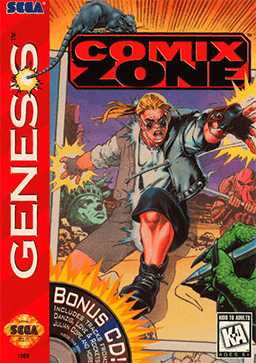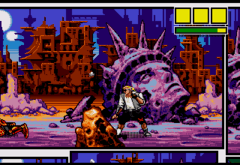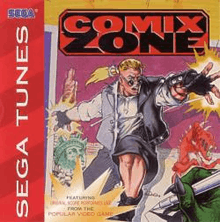Comix Zone
| Comix Zone | |
|---|---|
 | |
| Developer(s) | Sega Technical Institute |
| Publisher(s) | Sega |
| Designer(s) | Peter Morawiec |
| Programmer(s) | Adrian Stephens |
| Writer(s) | Peter Morawiec |
| Composer(s) | Howard Drossin |
| Platform(s) | Sega Mega Drive/Genesis, Windows, Game Boy Advance, Virtual Console, Xbox 360 (XBLA), PlayStation 3 (PSN), Cloud (OnLive), Steam |
| Release date(s) | August 2, 1995 |
| Genre(s) | Beat 'em up |
| Mode(s) | Single-player |
Comix Zone is a 1995 arcade-style beat 'em up video game, originally released as a Sega Genesis exclusive. An unusual feature of the game is that it is set within the panels of a comic book with dialogue rendered within talk bubbles and sprites and backgrounds possessing the bright colours and dynamic drawing style favoured by superhero comics. This style had been used in video games previously, for example Ocean Software's Batman: The Caped Crusader in 1988,[1] but Comix Zone stretched the idea to such an extent that Sega applied for and were granted a patent for a "Videogame system for creating a simulated comic book game".[2]
The concept for the game originated from a Commodore Amiga demo video animated by Peter Morawiec titled "Joe Pencil Trapped In The Comix Zone".[3] The video was made in 1992, displaying the animation of how the gameplay and the comic book elements would blend in.[4]
Plot

Sketch Turner, a "starving artist" and freelance rock musician living in New York City, is working on his newest comic book, named the "Comix Zone." Comix Zone is the story of the New World Empire's attempt to defend Earth from an invasion of alien renegades, with inspiration coming from Sketch's (oddly vivid) dreams and nightmares. One night, while Sketch is working on Comix Zone during a thunderstorm, a lightning bolt strikes a panel of his comic. In this instant, the main villain of Comix Zone - a powerful mutant named Mortus - manages to escape the comic book's pages, desiring to kill Sketch so he can become flesh and blood and take over the real world. Because he does not possess any power in reality, Mortus sends Sketch into the world of his own comic, freely drawing in enemies attempting to kill him.
Inside the comic book, Sketch meets General Alissa Cyan, who believes he is "the chosen one" who came to save their post-apocalyptic world from the evil of Mortus and the alien invaders. Ignoring Sketch's protests, Alissa sends him on his mission, keeping in touch with instructions and hints via radio. It is up to Sketch to stop Mortus' evil plans and find a way out of this comic world.
The game has two possible endings. At the end of the game, Alissa attempts to defuse a nuke, when Mortus comes into the comic and throws her into the chamber, which starts to fill up with liquid. Mortus then battles Sketch. If the player defeats Mortus and the Kreeps he summons quickly enough to drain the liquid and save Alissa, an ending occurs where Alissa comes to the real world with Sketch. Comix Zone is a huge success, being sold out on its first day, and Alissa joins the army, eventually becoming Chief of Security for the United States. Roadkill is given a vast amount of mozzarella cheese, and spends a lot of time exploring the city's new sewer system when not sleeping under a pile of Sketch's dirty socks.
If the player defeats Mortus after the chamber fills with liquid, Alissa dies. Sketch comes out, but his comic is destroyed. The last sentence in the cutscene says "Will Sketch recreate his adventure for a happier ending?"
Gameplay
Comix Zone is an action platformer in which players control Sketch as he progresses through panels of his comic book, hoping to reach the end and escape before his own creations finish him off. Each level consists of two pages and secrets are discovered by shredding the paper and revealing items. Along with standard attacks such as punching, kicking and jump attacks, Sketch can store up to three items in his inventory to help him overcome obstacles. Along with weapons such as bombs and knives which can also be used to destroy obstacles, Sketch can pick up iced tea to restore his health, and a fist that transforms Sketch into Super Sketch, dealing a powerful attack on all screen enemies. His pet rat Roadkill can discover hidden items and access areas that are too dangerous for Sketch to reach.
Sketch can also tear off the backdrop into a paper plane to throw at enemies, but this costs health and can also hurt Sketch if he's not careful. In order to progress through the pages, Sketch will often have to either successfully solve a puzzle, or defeat all the enemies within that panel. Arrows will then appear, allowing Sketch to jump to another panel, with some areas offering multiple routes.
Sketch's health is determined by a health bar, which is diminished when Sketch is damaged by enemies or obstacles. It will also diminish as Sketch punches through breakable objects or if he uses his paper plane move. If Sketch loses all his life, or falls down a bottomless pit, the game will end and Mortus will take his place in the real world.
However, the player can gain extra chances by clearing the first and second chapters, which will allow Sketch to resume from the beginning of the page should he die. Comix Zone is designed to be used with the 6-button gamepad: buttons X, Y and Z correspond to the three inventory slots Sketch has. If used with a 3-button gamepad, button C cycles through the items, and button A activates the item. Button C on a 6-button gamepad is used for a custom action, blocking by default - on a 3-button gamepad, Sketch blocks automatically.
Reception
On release, Famicom Tsūshin scored the Mega Drive version of the game a 30 out of 40.[5] GamePro considered the game's visuals a successful recreation of the look and feel of a comic book, but felt that the game quickly sours once the player encounters the repetitive combat and overly simplistic puzzles. They also found problems with the controls: "Sketch can't move rapidly around the panel, and button slamming yields unpredictable results." They concluded, "You really want to love Comix Zone for its original elements, but after a few panels, the honeymoon's over."[6]
Ports and related releases
The game was ported to the Game Boy Advance only in Europe on 11 September 2002, which was developed by Virtucraft and published by Sega. Although this version's music was also composed by Howard Drossin, fans criticised this port because of its music being very different from the Mega Drive's version. Also, while having a significantly smaller screen size that allowed much less on-screen, this was said to lessen the effect of seeing into the other frames around the player, making it more like a traditional platform game.
The game is also featured hidden within the Japanese version of Sonic Mega Collection and is an unlockable game in all versions of Sonic Mega Collection Plus, which is unlockable with having a Sonic Heroes game save, or is unlocked after starting all other Mega Drive games at least 50 times. The game is also part of the Sega Mega Drive Collection for the PlayStation 2 and PlayStation Portable. On 29 January 2007, Comix Zone was released for the Wii's Virtual Console, and Xbox Live Arcade on 10 June 2009. The game recently appeared in Sonic's Ultimate Genesis Collection (for Xbox 360 and PlayStation 3) and on June 3, 2010, it was made available through Steam. It is also included in the Sega Mega Drive pack. In August 2011 the game was made available for download on PlayStation Network as part of the SEGA Vintage Collection.
Music albums
Bonus CD
The North American release of Comix Zone included a heavy rock soundtrack, similar in style to early-1990s rock artists Nirvana and Soundgarden. The bonus CD had twelve music tracks from these American Recordings artists:
- Danzig - "Going Down to Die"
- Lordz of Brooklyn - "Saturday Night Fever"
- MC 900 Ft. Jesus - "Buried at Sea"
- Jesus and Mary Chain - "I Hate Rock and Roll"
- Love and Rockets - "Words of a Fool"
- Lords of Acid - "Do What You Want to Do"
- Stiffs, Inc. - "Chelsea"
- Julian Cope - "Try, Try, Try"
- God Lives Underwater - "No More Love"
- Ruth Ruth - "Uninvited"
- Laika - "44 Robbers"
- Lindsey - "Got it Going On"
Soundtracks
| Sega Tunes: Comix Zone | |
|---|---|
 | |
| Soundtrack album by Howard Drossin | |
| Released | August 20, 1996 |
| Genre | Video game soundtrack |
| Length | 18:39 |
| Label |
Delta Music Laser Light |
| Producer |
Howard Drossin Tim P. Philip Stevenson |
The European release of the Mega Drive and the Windows PC versions of the game included the Sega Tunes: Comix Zone soundtrack, which contains 'enhanced' music taken from the game's soundtrack and played by a full rock band. The soundtrack was later released in North America under the Sega Tunes label.
"Into the Zone" is a vocal version of the music heard in the games' Options screen (which is itself an extended version of the title screen music); "Feed my Disease" is based on the music heard in Episode 1, Page 2-1; "10,000 Knives" is based on the music heard in Episode 2, Page 2-2; "Seen it for Days" is based on the music heard in Episode 1, Page 1-2; "Woe is the World" is based on the game's Boss theme; and "Last to Follow" is based on the song heard in Episode 2, Page 1-3.
Lyrics & Vocals: Howard Drossin, Tim P.
Guitar: Howard Drossin; Solos on 2 & 5: Philip Stevenson
Bass Guitar: Weird Guy
Drums: Philip Stevenson
Producers: Howard Drossin, Tim P., Philip Stevenson
Executive Producer: Roger Hector
| Sega Tunes: Comix Zone track list | ||
|---|---|---|
| No. | Title | Length |
| 1. | "Into the Zone" | 3:04 |
| 2. | "Feed My Disease" | 2:39 |
| 3. | "10,000 Knives" | 3:22 |
| 4. | "Seen it for Days" | 3:52 |
| 5. | "Woe is the World" | 3:00 |
| 6. | "Last to Follow" | 2:40 |
References
- ↑ "Special FX". Retro Gamer. Imagine Publishing. Retrieved 22 July 2016.
- ↑ "Patent 6,010,405". US Patent Office. US Patent Office. Retrieved 22 July 2016.
- ↑ Horowitz, Ken. "Interview with Peter Morawiec". Sega-16.com. Sega-16. Retrieved 22 July 2016.
- ↑ https://www.youtube.com/watch?v=llMt1LN-di8
- ↑ NEW GAMES CROSS REVIEW: コミックスゾーン. Weekly Famicom Tsūshin. No.351. Pg.30. 8 September 1995.
- ↑ "ProReview: Comix Zone". GamePro. IDG (83): 64. August 1995.
External links
- Official Virtual Console website (Japanese)
- Comix Zone at MobyGames
- Demo Comix Zone